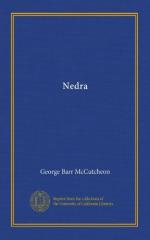Not until the pile was reduced to ashes did the smoke dance cease. The spearmen retired, and the big chief came forward with a tread so ludicrously grand that they could scarce refrain from laughter. He carried two short staffs in his hands, the heads of which were nothing less than the skulls of infants. To the disgust of the white people the chief presented to each of them a shudder-inspiring wand. Afterward they learned that the skull-tipped staffs signified death to all who opposed their way. They also learned that the red bits of wood that had gone up in the flame were stained by the blood of a half dozen prisoners of war, executed the night before as a sacrifice to the new gods.
The new monarchs accepted the sceptres gingerly and the wildest glee broke loose in the waiting throng. While they danced and shouted, Hugh inwardly cursed the ostentation that was delaying breakfast.
Impatiently he made the chief understand what was wanted, and that worthy proved an excellent substitute for the genii. He rushed over and bawled a few commands, and a dozen women and men sped away like the wind. A few moments later the chief entered the temple and found Ridgeway calmly measuring off the ground for the partitions that were to transform one room into three.
So apt was the white man at sign making and so apt was the brown man at understanding that before an hour had passed a dozen strong fellows were at work, carrying out the designs of the new idol, the morning meal having been disposed of in the meantime. Using the same kind of material that comprised the outer walls, a partition was constructed lengthwise through the centre of the temple. The front half was left as a reception hall and living room and the rear half was divided into two apartments, each fifteen feet square. They were to serve as sleeping rooms. These ruthless improvements made it necessary to remove the great stone idol from his pedestal.
“Chuck him out into the backyard,” said Hugh. That evening the poor old image, as disgusted as a piece of rock could possibly be, was carried to the river and tossed into the rapids, his successors standing with the multitude on the high bank to witness his disappearance and to hear his unhappy kerplunk! The waters closed over his unhallowed head and the new dispensation began. Back across the little plain to the torch-lit village swarmed the fickle, joyous savages.
“Good Lord,” observed Hugh, “what a ferocious crowd it is! They tear their enemies to pieces and yet we have them under our thumbs—for the present at least.”
“I believe they are naturally intelligent, and I’m sure we can help them. Do you know what those white robes are made from?”
“Certainly. Cotton.”
“It is woven grass. They bleach it. The women do the work down by the river, and the robes worn by their spearmen are really beautiful pieces of fabric.”
“I am going to leave my measure for a pair of white grass trousers,” said Hugh lightly, “and an umbrella,” he added, looking up at the broiling sky.




